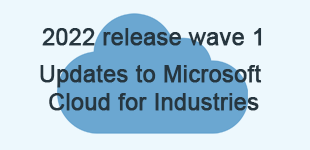Microsoft Cloud for Industry 2022 Wave 1 Updates – Improvements to Dynamics 365 / Power Platform

Microsoft bring together Microsoft Dynamics 365, Microsoft 365, and Microsoft Azure under the title of Microsoft Cloud for Industry. These tailored industry solutions are designed to accelerate time to value, speed up innovation and drive benefits across organisations.
Wave 1 2022 contains some improvements to the Dynamics 365 and Power Platform parts of those solutions. Some of these updates improve compliance with recognised standards of that industry. Profile enhancements offer further support to the needs of the industry and some updates extend usage within the industry to particular sectors.
Microsoft Cloud for Healthcare
- Care Team Collaboration using Teams and embedded Power Apps;
- Home Health Scheduling management powered by Dynamics for Field Service
- In App guided tours of the Solution
- Further HL7 FHIR data model enhancement
Microsoft Cloud for Financial Services
- Data Orchestration enhancements facilitating data movement and providing analytic readiness for banks. Customers are getting connectors to core banking systems, allowing for rapid data movement to Dataverse and into analytical layers as well as embeddable Power BI templates.
- Financial Services Data Model and functional enhancements for verticals:
- General Insurance:
- Customer snapshot
- Life events
- Insurance policies and coverages
- Claims summary
- Retail Banking:
- Banking contact centre enhancements to the Omnichannel for Customer Service hub based on preview customer feedback
- Loan tracker enhancements for customer onboarding
- Loan application sample portal enhancements to demonstrate the leverage of the SDK and UI components to further improve a potential end user experience to streamline the gathering of financial information
- Wealth Management
- Segmentation of Wealth management customers into groups that share similar values
- Life events
- Financial Goals
- Investments
- General Insurance:
Microsoft Cloud for Non-Profit
- Program Impact Dashboard enhancements, providing a holistic view of your programs, including revenue, budgets, donations, and impact for each program to measure the responsiveness of programs against goals.
- Donors and Supporters engagement, in the form of:
- Constituent management
- Personalised engagement
- Donation and award management
- Getting Started experiences for all products that make up Microsoft Cloud for Non-Profit. New and returning users who want to discover new feature and product information, leverage training materials, find out more about a workflow or a feature, such as
- Fundraising Management
- Volunteer Management
- Volunteer Engagement
- Payment processing enhancements, strengthening the architecture between Dynamics 365 and Azure that allow non-profit organisations to process donations in real time on their busiest fundraising days. One-time donations, recurring donations, payment schedules, and pledges are now more secure and reliable for all non-profits.
Microsoft Cloud for Sustainability
This is a whole new category that enables CEOs to measure and monitor beyond capturing data to helping customers aggregate sustainability data in an actionable way. It includes software as a service (SaaS) offerings that can discover and connect to real-time data sources, accelerate data integration and reporting, provide accurate carbon accounting, measure performance against goals, and enable intelligent insights for organisations to take more effective action.
- Calculation models enable both default and customisable calculation methods to be built and used, as needed. Default calculation models:
- Scope 1: Fugitive emissions, mobile combustion, stationary combustion.
- Scope 2: Purchased energy, purchased cooling, purchased steam and heat.
- Scope 3: Purchased goods and services, capital goods, upstream and downstream transportation and distribution, and business travel.
- Ecosystem of prebuilt data connectors providing recommendations for data connections from a catalogue of prebuilt connectors and operational data providers. The catalogue includes business solutions, energy providers, cloud providers, travel tools, trading partners, systems telemetry, and Internet of Things (IoT), to import current and accurate emissions information
- Dashboards and Reports. With a complete set of understandable data, customers can produce reports based on consumption, create an accurate baseline, and understand progress toward goals, while meeting strict regulatory and public reporting requirements
- An open source Common Data Model for Microsoft Cloud for Sustainability will provide a host of data model entities including:
- Emission sources
- Stationary combustion
- Mobile combustion
- Industrial process
- Fugitive emissions
- Purchased energy (includes heat, steam, and cooling)
- Key sub-entities – Fuel type, Vehicle type, Contractual instrument type
- Emission categories
- Purchased goods and services
- Capital goods
- Fuel and energy
- Transportation and distribution
- Waste
- Business travel
- Employee commute
- Leased assets
- Sold products
- End of life
- Franchises
- Investments
- Key sub-entities – Fuel type, Vehicle type, Contractual instrument type
- Emission factors
- Factor library
- Unit
- Unit group
- Emission factor
- Estimation factor
- Estimation factor type
- Parameter
- Greenhouse gas
- Supply chain emission factor
- Organisation
- Organisation unit
- Organisation hierarchy
- Facility
- Facility type
- Cooling type
- Heating type
- Org profile
- Industry classification
- Division master
- Major group master
- Core functionality
- Data ingestion
- Calculation
- Reporting
- Emission sources
If you have any questions or would like to find out more about Microsoft Cloud for Industries, please contact us


